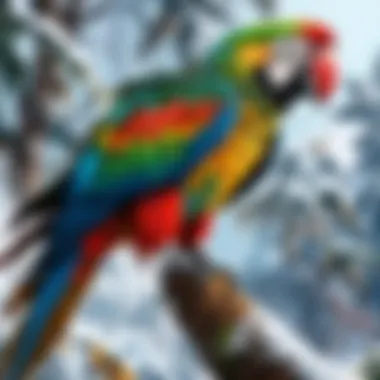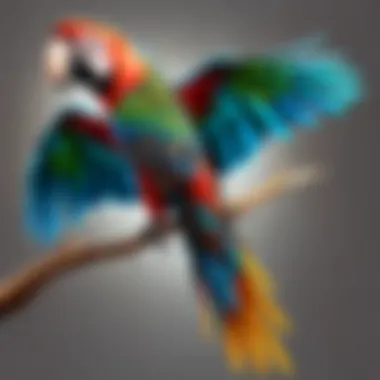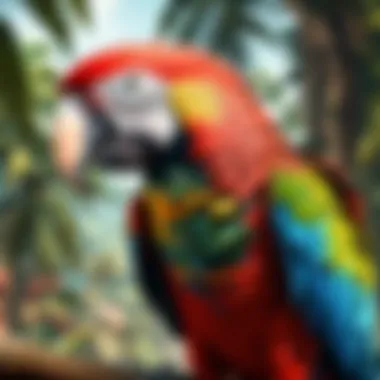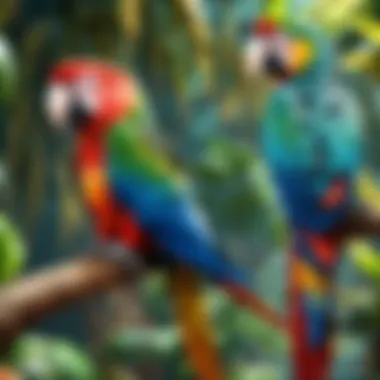Understanding the Financial Landscape of Macaw Parrots


Intro
Understanding the financial dynamics involved in owning a macaw parrot requires more than just cursory knowledge. Several factors coalesce to influence pricing for these exotic birds.
In this in-depth analysis, we will peel back the layers of how various species affect value, the role of breeding practices, geographical nuances, and the additional costs that ownership entails. By doing so, potential buyers can gain necessary insights to navigate this intricate landscape safely and effectively.
Species Diversity
Different types of macaw parrots come with their own market values. For instance, the blue and gold macaw is a favorite among pet owners, leading to higher prices. Other species, such as the scarlet macaw, might present different pricing dynamics based on their rarity or demand.
Several factors in species diversity can heighten or lower a macaw's worth. Key points to consider include:
- Scarcity: The less common a species, the higher the price usually is.
- Popularity: Often, species in demand have inflated price tags.
- Age: Younger birds may be priced higher due to their potential for training and companionship.
Breeding Practices
Breeding methods also significantly influence the pricing of macaw parrots. Aviculturists who engage in responsible breeding tend to set higher price points due to ethical considerations and quality assurance.
- Lineage: Birds bred from championship stock can command higher prices.
- Health: Well-bred macaws typically show fewer health issues, which can impact long-term care costs.
- Certification: Birds that are certified with health checks and lineage documentation may come at a premium but add value in terms of trust.
Geographic Availability
The region where a macaw is sold can affect its cost. For instance, certain areas may have greater access to rare species or better breeding programs. Moreover:
- Local Market: Prices can vary significantly based on the local demand and supply.
- Import Fees: Birds that are imported can carry extra costs associated with shipping, which may reflect in the final price.
Ownership Costs
Owning a macaw does not end with the initial purchase price. Prospective owners must account for some ongoing costs:
- Diet: Macaw parrots require a specialized diet that includes nuts, fruits, and vegetables.
- Housing: A spacious aviary is often necessary, which can be costly.
- Veterinary Care: Routine check-ups and potential medical issues can add up.
These financial responsibilities can influence the decision to purchase a macaw as well as the species chosen.
The initial cost of acquiring a macaw can often be misleading. Remember to factor in ongoing expenses for a more comprehensive insight into the financial landscape.
Finale
In summary, understanding the financial landscape of macaw parrots involves more than just the upfront cost. By examining species diversity, breeding practices, geographical availability, and ongoing ownership costs, potential buyers can make better-informed decisions about bringing a macaw into their lives.
Preamble to Macaw Parrots
The introduction of macaw parrots in this article is crucial as it sets the foundation for understanding their financial landscape. Macaw parrots are not just visually stunning creatures; they have complex behaviors, diverse species, and unique needs. As potential buyers, knowing these elements allows one to appreciate the worth and cost of owning a macaw.
Understanding Macaws
Macaws belong to the parrot family, known for their vibrant plumage and intelligence. They originate from Central and South America. Different species exhibit distinctive traits, sizes, and colors. The Scarlet Macaw and Blue-and-yellow Macaw are among the most recognized. These birds typically exhibit high intelligence, which requires stimulation and a well-planned environment. Their social behavior also necessitates interaction. Hence, understanding macaws goes beyond recognizing their beauty; it is essential for potential owners to know their needs and the implications for purchases.
The Appeal of Macaw Parrots
The allure of macaw parrots can be attributed to several factors. First, their striking appearance captivates many. Bright colors can enliven any home, attracting attention. Second, their engaging personalities make them suitable companions. Macaws are often social and can form strong bonds with their owners. This relationship can bring joy and companionship, making ownership a delightful experience. However, potential buyers must acknowledge the responsibilities accompanying such companionship. Investing in a macaw goes beyond the initial price; it involves long-term commitment and care. As a result, assessing both the appeal and the responsibilities is critical for any interested party.


The charm of macaw parrots lies not just in their beauty but also in their engaging dispositions, which require dedicated ownership.
Overview of Macaw Parrot Species
Understanding the diversity within macaw parrot species is essential for grasping their financial landscape. Each species carries its own market value, influenced by rarity, demand, and breeding conditions. The economic implications are not only important for potential buyers but also reflect broader trends in aviculture.
Common Species of Macaws
Common macaw species such as the Blue-and-Yellow Macaw, Green-Winged Macaw, and Scarlet Macaw are widely recognized. Their prevalence in the market means that prices are generally more stable. Buyers often choose these species due to their availability and established care information.
The popularity of these macaws can be attributed to several factors:
- Ease of Care: Their housing, diet, and social needs are well-documented, making ownership simpler.
- Affordability: Common species typically range in price from $1,000 to $3,500, depending on the breeder and location.
- Socialization: They are known for their friendly temperaments, which makes them appealing to first-time bird owners.
Rare and Exotic Species
On the other hand, rare species like the Hyacinth Macaw or the Spix's Macaw are considered luxury items within the macaw market. These species are less common and often come with a higher price tag, sometimes exceeding $10,000.
Several considerations show the financial interests surrounding these rare creatures:
- Conservation Status: Many rare species are endangered, increasing their value due to ethical and conservation concerns.
- Increased Demand: As enthusiasts seek unique pets, rare macaws have become sought after, further driving their prices higher.
- Investment Aspect: Some buyers view rare macaws as long-term investments, expecting their value to appreciate over time.
In summary, understanding the differences between common and rare macaw species is critical. The choices buyers make based on species influence costs significantly and also reflect broader trends in the avian pet market. This exploration helps potential owners align their choices with their budgets and lifestyle.
Factors Influencing Macaw Prices
Understanding the factors influencing macaw prices is crucial for anyone looking to invest in these vibrant birds. Various elements contribute to the financial aspect of owning a macaw parrot. A buyer's awareness of these factors can lead to informed decisions, ultimately impacting both the initial purchase and long-term costs. This section explores three significant factors: breeding practices, health and age of the parrot, and location and availability.
Breeding Practices
Breeding practices play a key role in determining the price of macaw parrots. Ethical breeders often follow stringent guidelines, ensuring the health and well-being of their birds. These breeders may charge higher prices due to the time, resources, and care invested in each parrot. Conversely, lower prices may suggest questionable breeding practices, which could lead to health problems down the line.
Reputable breeders often focus on specific traits and characteristics that enhance the lineage. Their dedication increases the market value of their birds, reflecting quality over quantity. Potential buyers should carefully research breeders to ensure their commitment to ethical practices. It is also beneficial to visit breeders to witness the living conditions and the health of the birds firsthand.
Health and Age of the Parrot
The health and age of a macaw parrot are pivotal factors in its pricing. Young macaws, particularly those in their prime years, tend to command higher prices. This is due in part to their potential for companionship and longevity, as macaws can live for several decades. Factors influencing this price include vaccinations, any recorded health issues, and overall physical condition.
Buyers should look for signs of health, such as bright eyes, healthy feathers, and activity levels. Any health concerns not addressed by the seller could lead to increased veterinary bills later and should be considered in the overall cost of ownership.
Location and Availability
The geographical location of buyers has significant implications for macaw prices. Regions with higher demand may see inflated prices due to scarcity, while local markets with more availability might offer lower prices. Understanding local trends can substantially impact a buyer's financial planning. Additionally, varies in the presence of reputable breeders in these areas can also affect the market. For instance, urban areas may offer access to a broader range of birds and possibly lower prices due to competition among breeders. Conversely, rural areas may present limited availability, potentially driving prices up regardless of species.
"Location is a dynamic aspect of pricing; it is essential to research and know local markets before deciding to buy a macaw."
Initial Purchase Price
The initial purchase price of macaw parrots holds significant importance within the broader financial landscape of their ownership. This price is typically the first financial consideration potential owners encounter. Understanding what influences this figure is crucial for informed decision-making. The price can vary dramatically based on several factors, including the species, age, and even source.
Price Range by Species
The price range for macaw species depends heavily on their rarity and popularity. For example, the Blue-and-yellow Macaw usually fetches a moderate price, while the Hyacinth Macaw, known for its striking color and size, commands a much higher price.


- Common Macaw Species:
- Rare Species:
- Blue-and-yellow Macaw: Approximately $1,000 - $1,500.
- Scarlet Macaw: Typically ranges between $1,500 - $3,000.
- Hyacinth Macaw: Can reach prices between $7,000 - $15,000.
- Lear's Macaw: Often goes for around $10,000 or more.
Several collectors factor in not only the species but also the bird's lineage and breeding background. High-quality breeding leads to a stout initial purchase price.
Market Trends
Market trends surrounding macaw parrots can shift with economic conditions and social interest in pet ownership. Over recent years, as the popularity of exotic birds continues to grow, so does the demand and willingness to pay premium prices. Seasonal trends can also have an impact. Around holidays, for instance, potential buyers' interest typically spikes, potentially driving prices up.
"As demand increases, so will the prices, making it essential for potential buyers to stay informed."
Additionally, online marketplaces and local breeders influence how macaw prices are set. Increased competition often leads to better pricing for buyers. However, one should always prioritize ethical sourcing and legality in these transactions.
Understanding the initial purchase price and the trends within the market is vital for anyone considering bringing a macaw into their home. Being knowledgeable can guide one in making sound financial decisions while ensuring the welfare of the bird.
Long-Term Costs of Ownership
Understanding the long-term costs of ownership is crucial for anyone considering adopting a macaw parrot. These costs extend well beyond the initial purchase price. Owning a macaw requires commitment, responsibility, and financial planning. Different aspects come into play, such as diet, health care, and habitat setup. Each factor contributes significantly to the overall cost, and potential owners must weigh these against their budget and lifestyle.
Dietary Requirements
Macaws have specific dietary needs that are essential for their health. A balanced diet typically includes a variety of fresh fruits, vegetables, nuts, and high-quality pellets designed for parrots. While some owners may consider standard birdseed as sufficient, it lacks the necessary nutrients. Proper nutrition can be more expensive but is vital for longevity and well-being.
- Fresh Fruits and Vegetables: These should make up a portion of their daily intake. Seasonal variations in prices can impact overall feeding costs throughout the year.
- High-Quality Pellets: Selecting a reputable brand often requires a higher initial investment, but it can save money in health-related expenses later.
Regular dietary adjustments and monitoring will also incur additional costs. Supplements or special foods for older birds could be necessary, adding financial pressure during their lives.
Veterinary Care
Routine veterinary care is another substantial cost for macaw owners. Like any pet, regular check-ups are essential. Many birds, including macaws, often hide illnesses until advanced stages, so proactive health measures are critical.
- Initial Health Check: Upon acquiring a macaw, a vet visit for a thorough health examination is advisable. This ensures the bird is healthy.
- Annual Check-Ups: Routine health exams can vary in price but should be budgeted annually.
- Unexpected Illness: Conditions that require urgent care can significantly impact finances. Emergency treatments or surgeries can reach thousands of dollars.
Maintaining an emergency fund for your pet's health ensures you are prepared for unforeseen expenses, promoting the well-being of your macaw.
Enclosure and Habitat Setup
Creating a suitable environment for a macaw is not just about aesthetics; it is also about the investment in a healthy and safe habitat. The initial setup may require considerable expense but is crucial for an enriching experience for the bird.
- Cage Costs: A large, appropriate cage can range from several hundred to a few thousand dollars. This cost depends on size and material quality.
- Toys and Enrichment: Macaws are intelligent and active birds that need mental stimulation. Regularly purchasing new toys, perches, and items for enrichment can add to ongoing costs.
- Regular Maintenance: The habitat should be cleaned and maintained regularly, which may require cleaning supplies and additional accessories over time.
Investing properly in the enclosure from the beginning can prevent further issues and discomfort for macaws.
Long-term ownership of macaw parrots involves considering several financial factors that impact both their health and happiness.
In summary, long-term costs are a critical aspect of macaw ownership that potential buyers need to understand. Adjusting one’s financial planning can lead to a more enjoyable experience for both the owner and their macaw.
Legal Considerations
Understanding the legal framework surrounding pet ownership is crucial for anyone considering acquiring a macaw parrot. This section addresses laws that regulate the ownership of these birds, and explores how such regulations can influence market prices. Knowledge of these legal aspects not only protects buyers but also ensures ethical practices within the breeding and selling industries.


Laws Regarding Pet Ownership
Many countries and regions have specific laws that govern the ownership of exotic pets, including macaws. These laws may vary significantly depending on the location. For instance, in the United States, the federal government, through the Endangered Species Act, regulates the import and sale of certain macaw species that are considered endangered or threatened.
Additionally, individual states have their own laws that can further restrict or regulate macaw ownership. Some states may require permits, while others may completely ban the ownership of certain species. It is essential for prospective owners to be aware of these regulations before making a purchase. Not only do they protect wild populations, but they also ensure that owners are prepared for the responsibilities that come with caring for such complex creatures.
Understanding the local legal context can save prospective owners from hefty fines or confiscation of their pets.
Impact of Regulations on Prices
The regulations surrounding macaw ownership also have a notable effect on their prices. Stricter laws often lead to decreased supply, especially for rare or endangered species. When certain macaw species are classified as endangered, it becomes more difficult for breeders to legally sell them. Consequently, this can lead to an increase in market prices due to their limited availability.
Moreover, compliance with legal requirements can create additional costs for breeders and sellers, which may be transmitted to the buyer. For example, if a breeder has to obtain special permits or follow strict breeding guidelines, they may pass on these expenses in the sale price of the macaw.
In summary, the legal landscape surrounding macaw parrots plays a pivotal role in their market pricing. Understanding these regulations can help potential buyers make informed decisions, ensuring that they are legitimating engaging in ethical pet ownership.
Marketplaces for Macaw Parrots
Understanding where to obtain a macaw parrot is vital for potential owners. The marketplace influences the price, availability, and overall health of the parrot. When discussing macaw prices, it is essential to highlight both reputable breeders and the option of adoption. Each option comes with its unique benefits, considerations, and responsibilities.
Reputable Breeders
Choosing a reputable breeder is critical for ensuring the quality and well-being of a macaw parrot. A good breeder provides healthy birds and often guarantees that the birds have been bred under proper conditions.
Key Considerations for Selecting a Breeder:
- Health Certifications: Breeders should be transparent about the health of their birds, often providing documentation of veterinary checks. This is essential to avoid future health issues.
- Breeding Practices: Ethical breeding practices ensure the overall well-being of the birds. A good breeder will apply standards that promote the health and happiness of their macaws.
- Environment: Visit the breeding facility, if possible. A clean and safe environment reflects the care given to the birds. Observe how the birds interact with their surroundings and with people.
It is also a good idea to research reviews or testimonials about specific breeders. Websites like reddit.com often have discussions about reputable breeders and experiences from other macaw owners.
Adoption vs.
Purchase
Adopting a macaw can be as rewarding as purchasing one from a breeder. Different pathways come with distinct benefits. Understanding these can help potential owners make informed choices.
Benefits of Adoption:
- Cost-Effective: Typically, adopting a macaw will be less expensive than purchasing one. Adoption fees often cover basic veterinary care.
- Saving a Life: Many macaws need homes due to various reasons, including previous owners no longer being able to care for them.
- Support Services: Many adoption agencies provide post-adoption support and resources. This can aid new owners in transitioning into macaw care.
Drawbacks of Adoption:
- Unknown History: Often, adopted macaws come with unknown health histories, which can lead to unforeseen vet costs.
- Behavioral Issues: Some macaws may require more socialization and training compared to those from breeders. Understanding the background of the bird is crucial.
Ultimately, each option requires thorough research, as neither route guarantees a perfectly healthy or well-adjusted bird. Assess personal circumstances and preferences to choose the best path forward.
The End
The conclusion of this article serves to underscore the significance of comprehending the financial landscape surrounding macaw parrots. It wraps together various elements discussed throughout the piece, focusing on the intricate balance of cost implications and ownership considerations. By following the explored factors—species diversity, breeding standards, and ongoing ownership costs—potential buyers can make informed decisions about acquiring a macaw.
Summary of Findings
In summary, several key insights have emerged from the analysis. First, the initial purchase price of macaw parrots varies significantly based on species. For instance, a Blue-and-Gold Macaw often commands a higher price due to its popularity and rarity compared to other species.
Moreover, breeding practices play a crucial role in determining these initial costs. Reputable breeders who adhere to ethical and best practices can ensure a higher quality bird, thus impacting market prices positively. Alongside this, the health and age of the bird are vital considerations—newly weaned birds may present different financial implications compared to older, ready-to-breed macaws.
Additionally, the geographical availability of specific species affects pricing. Regions with limited access often see inflated costs due to transportation and scarcity. Furthermore, the long-term financial commitments associated with feeding, healthcare, and habitat setup cannot be overlooked. These costs must be fully understood to prepare for the ongoing responsibility of caring for such a bird.
“Owning a macaw is not just about the purchase. It is a long-term commitment involving significant financial considerations.



